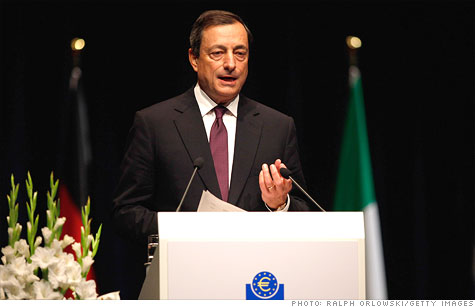Search News

New ECB President Mario Draghi said Thursday that Europe is heading towards a mild recession by the end of the year.
NEW YORK (CNNMoney) -- The European Central Bank cut interest rates for the first time in two years Thursday, reversing a direction set earlier this year, as the new head of the monetary authority said Europe is heading into a mild recession.
"What we are observing now is slow growth heading towards a mild recession by year end," said Mario Draghi, the former Italian central banker who became president of the ECB on Tuesday.
In response the ECB cuts its key rate to 1.25% from 1.5%, less than four months after it raised the rate in an effort to battle inflation.
Investors had only been betting on about a 35% chance of a rate cut, so the announcement was a pleasant surprise to many. Stock markets in Paris and Frankfurt shot up on the rate cut annoucement, and opened higher in New York soon after that.
But some of those gains disappeared a little more than an hour after the rate annoucement when Draghi gave his recession forecast in a press conference.
Unlike the Federal Reserve, which has a dual mandate to promote stable prices and maximum employment, the ECB's charge is solely to focus on price stability. That is the reason the higher inflation earlier this year prompted rate hikes by the ECB, despite economic weakness in the eurozone at that time.
Still some economists said Thursday's move, while welcome, was too modest, given the problems faced by the European economy. Julian Callow of Barclays Capital said that another cut of at least another quarter percentage point at the December meeting is almost a certainty.
"I suppose we should be grateful for something rather than nothing," he said. "The sooner, the bigger the better."
Draghi conceded inflation in Europe is likely to stay above its preferred 2% target for at least several months, but he said the slowdown in the economy and other factors should reduce inflation in 2012.
But with the growing uncertainty over the bailout of the Greek sovereign debt and what a default of those bonds could mean for the financial system, the ECB decided it needed to cut rates.
At its September meeting, the ECB cut its economic growth forecast and said there is a risk that growth will slow to a near standstill next year, but stopped short of warning of a new recession.
Many economists have speculated that a recession is likely in Europe, if not inevitable given weak growth and uncertainty in financial markets. Still, Draghi's outlook of even a mild recession later this year was striking. Central bankers are typically reluctant to speak about the risk of a recession or even acknowedge one before it is well documented by economic readings.
For example, Fed Chairman Ben Bernanke continued to dodge questions about whether the U.S. economy had fallen into a recession until about a year after the start of the recession in December 2007. In April of 2008, he still would only say that a recession was possible in response to questions.
"Mentioning the word 'recession' was definitely a doozy. But I like it," said Ashraf Laidi, a currency trader and CEO of Intermarket Strategy Ltd. "It was a reality check for those who might oppose a rate cut."
In October, the ECB announced a program to pump additional cash into the European economy through the end of next year, as well as a program to buy up to €40 billion in the distressed sovereign debt of the weaker European nations.
But since those meetings the risk of a uncontrolled default of Greek debt has continued to rise, despite a tentative bailout deal reached last week among European leaders, although Greek President George Papandreou backed off plans Thursday to hold a controversial referendum that could have taken Greece out of the eurozone.
Draghi's candor about a European recession vanished when he was asked about what would happen if Greece pulls out of the euro, repeating early statements of the ECB that provisions for such an exit do not exist in the treaty that formed the common European currency.
He said the ECB is confident that if the various parts of the deal announced last week are implemented, it "will quiet many concerns" about a meltdown in the financial system.
But he added it is hard to comment on the situation with Greek debt since the situation there is "fast evolving." And he also reluctant to address concerns about the impact a Greek default might have on other troubled European countries.
"The Greek situation is exceptional and unique," he said.
And he said it's not the job of the ECB to stop countries from leaving the eurozone.
"What makes you think becoming the lender of last resort for governments is actually the thing you need to keep the eurozone together?" he said, answering one question with a question of his own. ![]()
| Overnight Avg Rate | Latest | Change | Last Week |
|---|---|---|---|
| 30 yr fixed | 3.80% | 3.88% | |
| 15 yr fixed | 3.20% | 3.23% | |
| 5/1 ARM | 3.84% | 3.88% | |
| 30 yr refi | 3.82% | 3.93% | |
| 15 yr refi | 3.20% | 3.23% |
Today's featured rates: